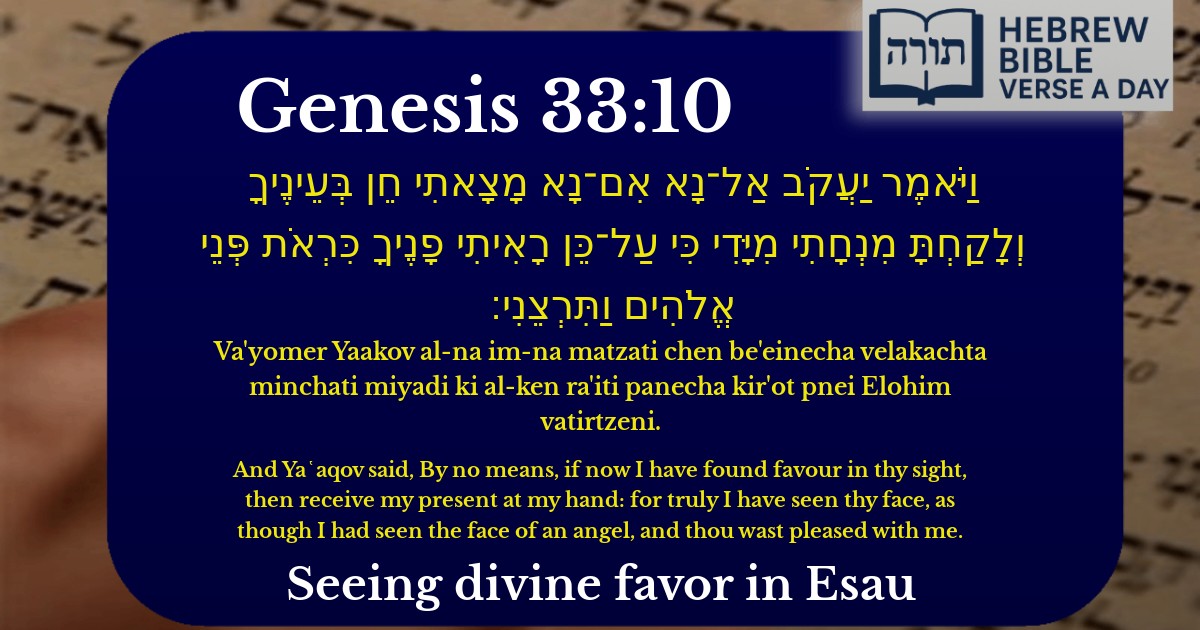Join Our Newsletter To Be Informed When New Videos Are Posted
Join the thousands of fellow Studends who rely on our videos to learn how to read the bible in Hebrew for free!
Hebrew Text
וַיֹּאמֶר יַעֲקֹב אַל־נָא אִם־נָא מָצָאתִי חֵן בְּעֵינֶיךָ וְלָקַחְתָּ מִנְחָתִי מִיָּדִי כִּי עַל־כֵּן רָאִיתִי פָנֶיךָ כִּרְאֹת פְּנֵי אֱלֹהִים וַתִּרְצֵנִי׃
English Translation
And Ya῾aqov said, By no means, if now I have found favour in thy sight, then receive my present at my hand: for truly I have seen thy face, as though I had seen the face of an angel, and thou wast pleased with me.
Transliteration
Va'yomer Yaakov al-na im-na matzati chen be'einecha velakachta minchati miyadi ki al-ken ra'iti panecha kir'ot pnei Elohim vatirtzeni.
Hebrew Leining Text
וַיֹּ֣אמֶר יַעֲקֹ֗ב אַל־נָא֙ אִם־נָ֨א מָצָ֤אתִי חֵן֙ בְּעֵינֶ֔יךָ וְלָקַחְתָּ֥ מִנְחָתִ֖י מִיָּדִ֑י כִּ֣י עַל־כֵּ֞ן רָאִ֣יתִי פָנֶ֗יךָ כִּרְאֹ֛ת פְּנֵ֥י אֱלֹהִ֖ים וַתִּרְצֵֽנִי׃
וַיֹּ֣אמֶר יַעֲקֹ֗ב אַל־נָא֙ אִם־נָ֨א מָצָ֤אתִי חֵן֙ בְּעֵינֶ֔יךָ וְלָקַחְתָּ֥ מִנְחָתִ֖י מִיָּדִ֑י כִּ֣י עַל־כֵּ֞ן רָאִ֣יתִי פָנֶ֗יךָ כִּרְאֹ֛ת פְּנֵ֥י אֱלֹהִ֖ים וַתִּרְצֵֽנִי׃
🎵 Listen to leining
Parasha Commentary
📚 Talmud Citations
This verse is not quoted in the Talmud.


Context of the Verse
This verse (Bereshit 33:10) occurs during Yaakov's reunion with his brother Eisav after many years of separation. Yaakov, fearing Eisav's anger, had prepared gifts (מִנְחָה) to appease him. When Eisav initially refuses the gifts, Yaakov insists, using this heartfelt plea.
Yaakov's Humility and Diplomacy
Rashi explains that Yaakov's phrasing "אַל־נָא" ("By no means") demonstrates his humility and insistence that Eisav accept the gift as a gesture of goodwill. The term "אִם־נָא" ("if now") reflects Yaakov's careful diplomacy, acknowledging Eisav's potential reluctance while emphasizing his own sincerity.
Seeing the Face of an Angel
The phrase "כִּרְאֹת פְּנֵי אֱלֹהִים" ("as though I had seen the face of an angel") is interpreted in several ways:
The Significance of the Gift
Yaakov emphasizes that the gift is not merely material but symbolic of their restored relationship. The Sforno notes that the gift represents Yaakov's desire for peace, reinforcing that Eisav's acceptance signifies divine favor ("וַתִּרְצֵנִי"—"and thou wast pleased with me").
Halachic and Ethical Lessons